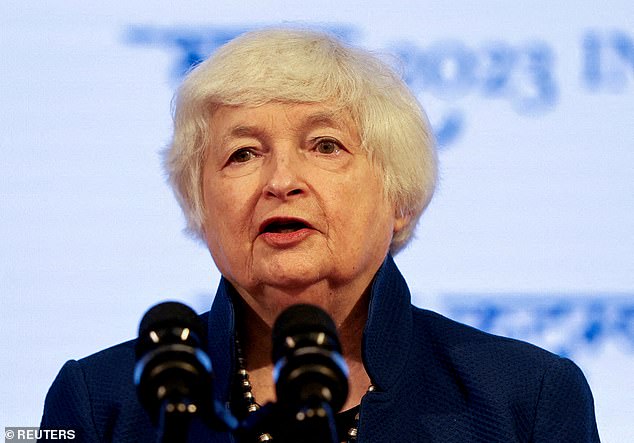Britain knows all about crisis in the bond markets and how quickly events can spin out of control.
Efforts by Liz Truss and Kwasi Kwarteng to restore the Tory low tax narrative crashed to earth, forcing them out of Downing Street as the price of gilt-edged stock crashed, yields soared, the cost of mortgages shot up and pensions came close to imploding.
Successors Rishi Sunak and Jeremy Hunt have spent much of the last year seeking to restore market confidence in the stability of the UK public finances.
The Gaza conflagration and concerns that it could spread to Israel’s northern borders and Iran is triggering fresh alarm in the US Treasury market which provides lubrication for much of the global economy.
President Biden’s big-spending ways may have found support among progressives, including the Labour Party, but they continue to unnerve bond markets.

Confident: US Treasury Secretary Janet Yellen (pictured) asserts there is no ‘dysfunction’ in Treasury market in spite of the spike in yields
Reports that, fresh back from Israel, Biden will ask Congress for another $100billion (£83billion) to help fund military campaigns there and in Ukraine are unlikely to be greeted with equanimity among lawmakers or on the bond markets.
There is paradox in the latest eruption on the US Treasury market. In latest trading, the yield on US government bonds climbed close to 5 per cent for the fourth day in a row.
That is a level not seen since 2007 and the first cracks in the banking system which led to the great financial crisis.
In a period of geopolitical uncertainty, one would normally expect the biggest asset managers and traders to seek the safest havens, such as the dollar.
Gold tends to get a boost but it is only of limited interest because the market is not deep or liquid enough any longer. So US bonds, or Treasuries, are normally the port of call for investors seeking to protect wealth should the world go up in smoke.
But not this time. The banking meltdown, the pandemic, Ukraine and now the Middle East mean the US has joined the club of nations where the debt to output ratio is above 100 per cent.
US Treasury Secretary Janet Yellen asserts there is no ‘dysfunction’ in the Treasury market despite the spike in yields.
Her comments are being treated with scepticism by bond vigilantes, the self-appointed guardians of stability.
The markets are readjusting after the era of free and easy money, and interest rates will stay higher for longer than anyone predicted.
They are doing the Fed’s job for it by putting the brakes on a buoyant American economy which refuses to be tamed.
But should tensions escalate in the Middle East, don’t be surprised if Yellen proves right as strong US yields and security trump all else.
Off-key
The announcement of a ‘strategic review’ by Hipgnosis looks like an effort by founder Merck Mercuriadis to save his own skin.
Flaccid chairman Andrew Sutch (soon to be on his way) has been ineffectual in controlling Merck’s exuberance.
The plan to sell some glittering names including Kaiser Chiefs, Shakira and Barry Manilow to a rival owned by Blackstone and advised by Mercuriadis was a huge conflict of interest.
Before shareholders dump him altogether, they should recognise that he is a pioneer in song royalties, who made many acquisitions before the biggest beasts in music, such as Universal, began to bid up values. It is disappointing that royalty revenues are being downgraded and that the performance of the fund has never matched the promise.
But there is intrinsic value in what he has created. With more professional, less mercurial management and a tougher, more trusted board it ought be possible to rescue something worthwhile from the wreckage.
Investors should vote against the Blackstone deal, seek to rebuild the enterprise rather than liquidate it, and find a more financially astute chief executive.
Travel bug
Any thought that royal ratcatcher Rentokil should up sticks and move its share quote to New York following its £5.5billion purchase of Terminix last year, making the US its biggest market, should be rejected.
Admittedly, revenue growth has been slow but that can be fixed. Rentokil has been ridding Britain of pests since the 1920s and with a new plague of bed bugs, among other things, has huge growth opportunities.
British firms have found switching to Wall Street may get a loud cheer at the opening bell but it condemns overseas enterprises to anonymity.



